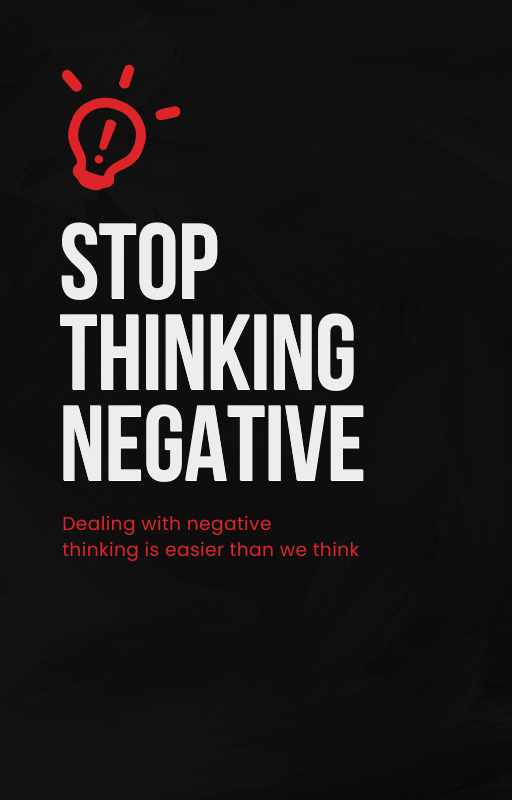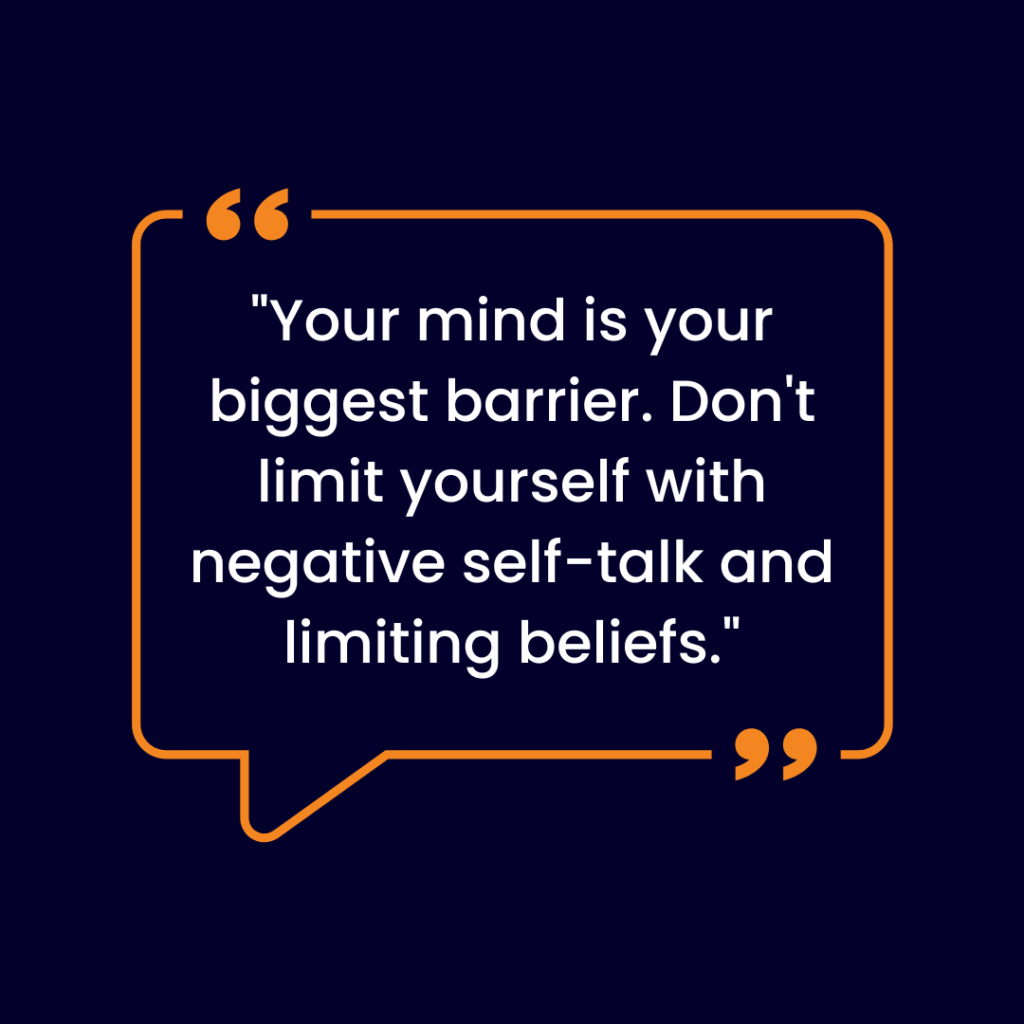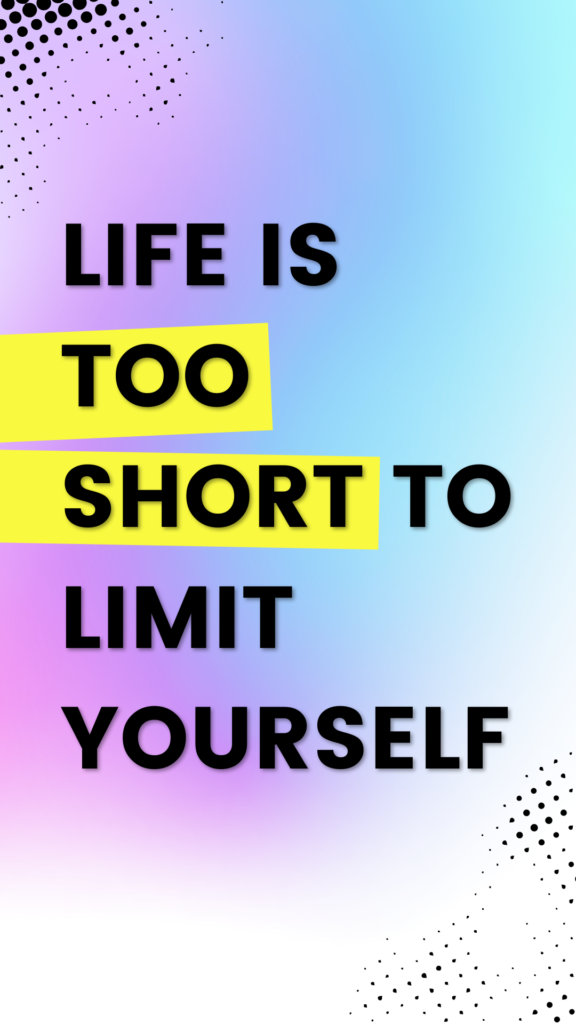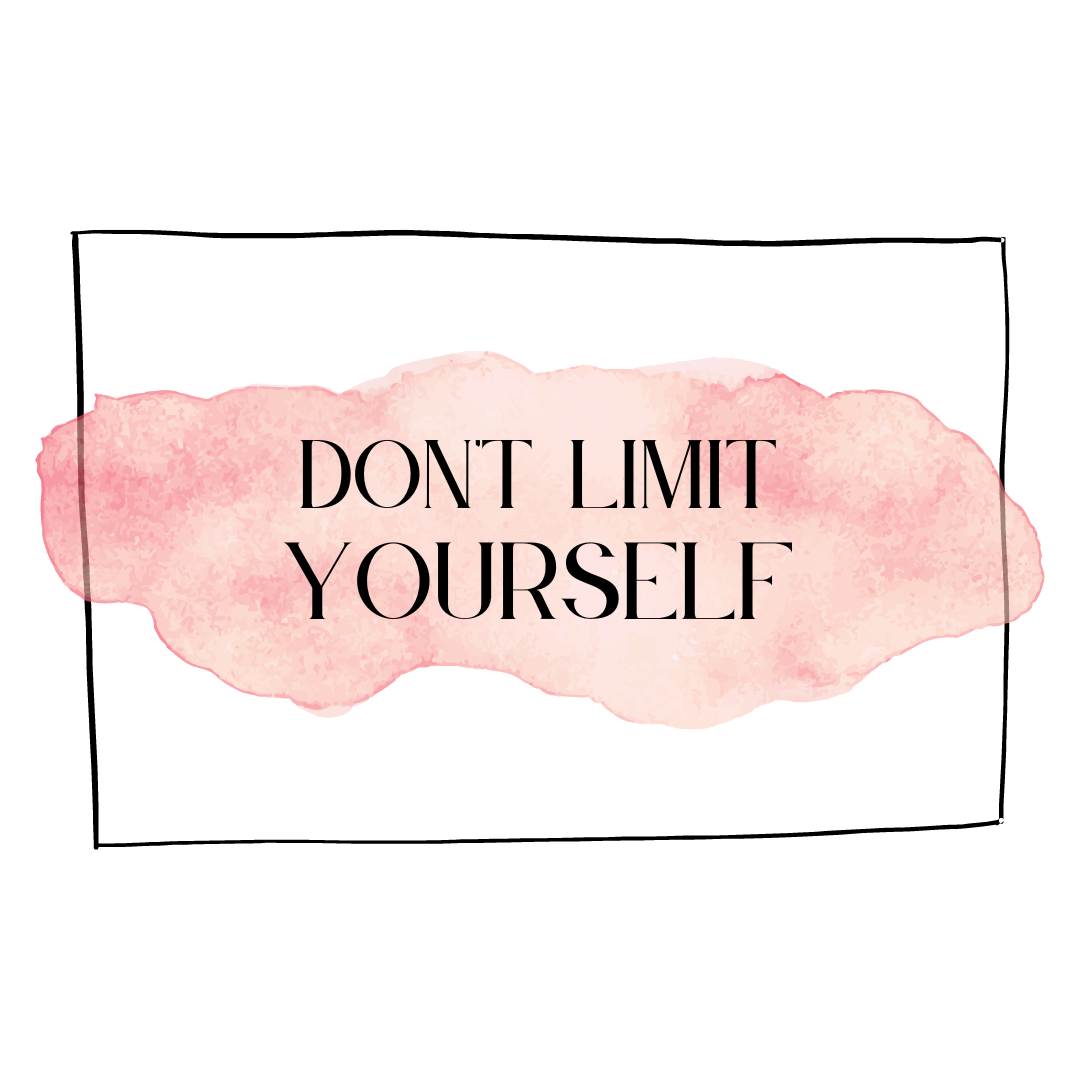Do you limit yourself in life situations?
Limiting yourself because you think you cannot do it is a self-imposed barrier that prevents you from reaching your full potential. When you believe that you cannot do something, you are placing a mental block on yourself that can prevent you from even attempting to achieve your goals. This can cause you to miss out on important opportunities and can prevent you from achieving your dreams.
Many people limit themselves because they lack self-confidence or have experienced failure in the past. They may believe that they are not good enough, smart enough, or talented enough to achieve their goals. However, it is important to remember that everyone experiences failure at some point in their lives. The key is to learn from your mistakes and use them as opportunities for growth and improvement.
If you limit yourself because you think you cannot do something, you are also limiting your creativity and imagination. By allowing yourself to believe that you cannot do something, you are closing off your mind to new ideas and possibilities. This can prevent you from finding innovative solutions to problems and can hinder your ability to think outside the box.

There are numerous examples of people limiting themselves and never attempting to do something, which ultimately leads to failure. Here are a few examples:
- Giving up on a dream career: Many people limit themselves when it comes to pursuing their dream career. They may believe that they do not have the necessary skills or qualifications, or they may fear failure. As a result, they never even attempt to pursue their dream career and end up settling for a job they don’t enjoy.
- Refusing to take risks: Another way people limit themselves is by refusing to take risks. They may fear failure or rejection and never take a chance on a new opportunity or idea. This can prevent them from reaching their full potential and can lead to missed opportunities.
- Avoiding social situations: People may limit themselves socially by avoiding situations that make them uncomfortable or anxious. This can prevent them from making new friends, networking, or even pursuing romantic relationships.

- Not pursuing education: Some people limit themselves by not pursuing further education or learning new skills. They may believe that they are not capable of learning or may not have the time or resources to pursue education. This can limit their career opportunities and prevent them from achieving their full potential.
- Giving up on personal goals: Finally, people may limit themselves by giving up on personal goals or dreams. They may believe that they are not capable of achieving their goals or that they do not have the time or resources to pursue them. This can prevent them from achieving personal growth and can lead to feelings of regret and unfulfillment.
One of the most important things to remember when you feel like you cannot do something is to take small steps towards your goal. Breaking down your goal into smaller, more manageable tasks can help you build momentum and gain confidence in your abilities. Celebrate each small victory and use it as motivation to keep moving forward.
It is also important to surround yourself with positive influences and people who believe in you. Negative people and self-doubt can be toxic and can reinforce limiting beliefs. Surrounding yourself with people who support and encourage you can help you overcome self-doubt and limit your own self-imposed barriers.

What are some common reasons people limit themselves? There can be several reasons why people limit themselves, some of the common ones include:
- Fear of failure: People often limit themselves because they fear they might fail if they try something new or take on a challenge.
- Lack of self-confidence: Some individuals may lack confidence in their abilities, and as a result, they may limit themselves and their potential.
- Past experiences or failures: Negative experiences or past failures can create limiting beliefs that prevent people from taking risks or trying something new.
- Social and cultural conditioning: Societal and cultural expectations can create self-limiting beliefs that prevent people from pursuing their goals or living their lives on their own terms.
- Negative self-talk: People may limit themselves due to negative self-talk or inner dialogue, which can create doubt and hold them back.
- Comfort zones: People may limit themselves by staying in their comfort zones, which can prevent them from taking risks or trying something new.
- Lack of knowledge or skills: Individuals may limit themselves if they lack the necessary knowledge or skills to pursue their goals or aspirations.
- Procrastination: People may limit themselves by procrastinating and putting off important tasks or actions, which can prevent them from achieving their goals.

How can limiting beliefs and self-doubt impact a person’s life?
Limiting beliefs and self-doubt can impact a person’s life by preventing them from taking risks, trying new things, or pursuing their goals and dreams. This can lead to missed opportunities, unfulfilled potential, and feelings of regret and disappointment.
What are some strategies for overcoming limiting beliefs and self-doubt?
Some strategies for overcoming limiting beliefs and self-doubt include identifying and challenging negative self-talk, setting small achievable goals, surrounding yourself with positive influences, seeking support from friends and family, practicing self-care, and developing a growth mindset.

How can a fear of failure limit a person’s potential?
A fear of failure can limit a person’s potential by preventing them from taking risks and trying new things. This can prevent them from learning from their mistakes and growing as a person. It can also prevent them from achieving their goals and dreams.
How can societal pressures and expectations limit a person’s choices and opportunities?
Societal pressures and expectations can limit a person’s choices and opportunities by influencing their beliefs and values. They may feel pressure to conform to certain expectations or social norms, even if it goes against their personal goals and aspirations. This can limit their ability to pursue their dreams and achieve their full potential.
How can setting small goals help overcome self-imposed limitations?
Setting small goals can help overcome self-imposed limitations by breaking down larger goals into more manageable tasks. This can help build momentum and confidence and make the larger goal seem less daunting. Celebrating small successes along the way can also provide motivation to keep pushing forward.
How can a growth mindset help a person overcome limiting beliefs and reach their full potential?
A growth mindset involves the belief that abilities and intelligence can be developed through hard work and dedication. This can help a person overcome limiting beliefs by promoting a focus on learning and growth rather than fixed abilities. It can also help a person develop resilience and persistence in the face of challenges.
How can surrounding yourself with positive influences help overcome self-doubt and limiting beliefs?
Surrounding yourself with positive influences can help overcome self-doubt and limiting beliefs by providing support and encouragement. Positive influences can help challenge negative self-talk and beliefs and promote a growth mindset. They can also provide motivation and inspiration to pursue goals and dreams.
How can a lack of self-confidence and self-esteem limit a person’s ability to achieve their goals?
A lack of self-confidence and self-esteem can limit a person’s ability to achieve their goals by creating self-doubt and negative self-talk. This can prevent them from taking risks and trying new things, and can lead to missed opportunities. It can also lead to a lack of motivation and feelings of inadequacy.
What are some ways to build resilience and push beyond self-imposed barriers?
Some ways to build resilience and push beyond self-imposed barriers include developing a growth mindset, practicing self-care, seeking support from friends and family, setting achievable goals, learning from mistakes, and focusing on the process rather than just the outcome. It is also important to challenge negative self-talk and beliefs and to celebrate small successes along the way.
Limiting yourself because you think you cannot do something is a common mistake that many people make. It can prevent you from reaching your full potential and can limit your creativity and imagination. It is important to remember that failure is a natural part of the learning process, and that taking small steps towards your goal can help build momentum and confidence. Surrounding yourself with positive influences can also help you overcome self-doubt and limit your own self-imposed barriers. By challenging yourself and pushing beyond your limits, you can achieve great things and reach your full potential.
